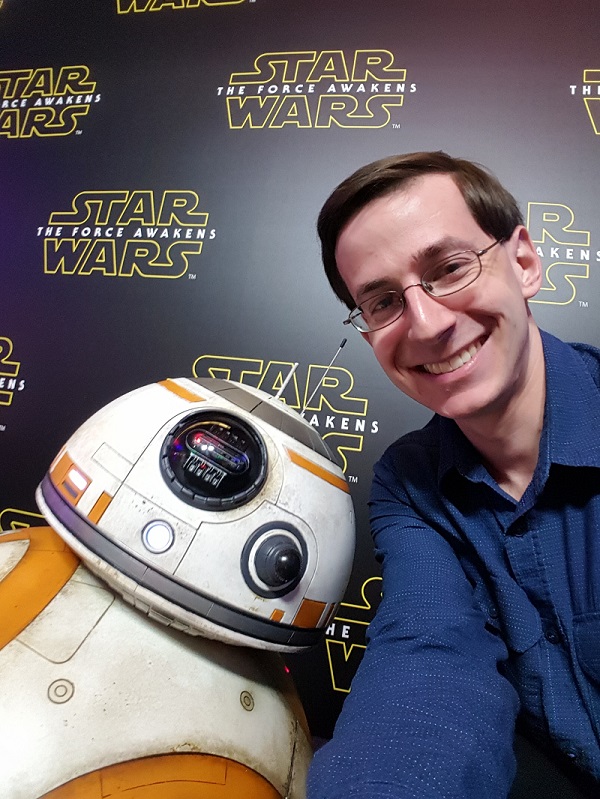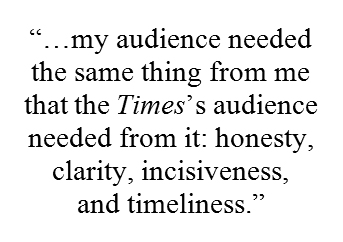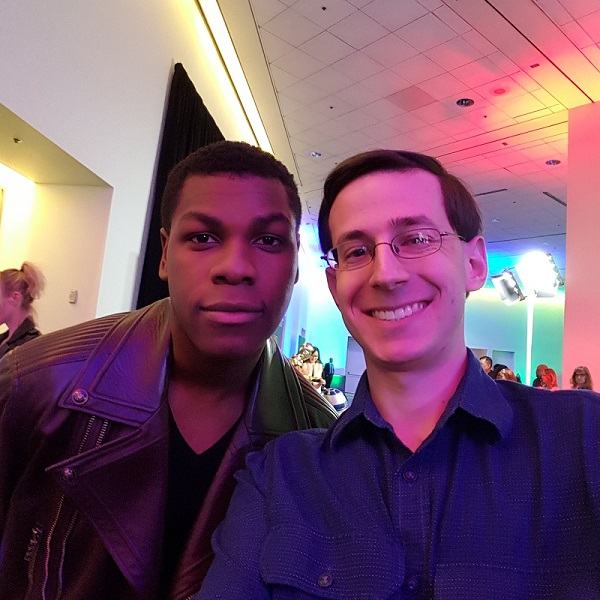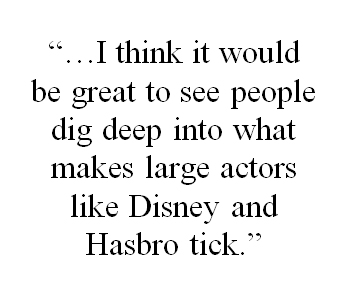 I began my interview series Better Know a Fan almost exactly one year ago as a method of engaging directly with Star Wars fans who had very different backgrounds and points of view than myself; people whom I respected but couldn’t quite get my head around without a little extra work. If you follow this site on Twitter, you’ll know that there’s no one I struggle with more often than Eric Geller, current writer and editor for the Daily Dot news website, and like myself an evacuee of TheForce.net.
I began my interview series Better Know a Fan almost exactly one year ago as a method of engaging directly with Star Wars fans who had very different backgrounds and points of view than myself; people whom I respected but couldn’t quite get my head around without a little extra work. If you follow this site on Twitter, you’ll know that there’s no one I struggle with more often than Eric Geller, current writer and editor for the Daily Dot news website, and like myself an evacuee of TheForce.net.
I’ve never told Eric this, but part of the reason I mix it up with him so often is because he reminds me of myself at his age—restless, hyperopinionated, and as he would say, thirsty—except I didn’t have anything approaching the microphone your average young and excitable Star Wars fan has now thanks to the ubiquity of social media. Eric’s already gone much further as a real journalist than I have as a fake one (he met BB-8, for god’s sake), and while I feel compelled to impart upon him some of the humility and composure I’ve picked up in the last ten years, the fact is I’m also just a teensy bit jealous. Nevertheless, he indulged me with this interview.
How did you become a Star Wars fan? Did you just grow up with it or was it something you consciously discovered at a certain point?
I first saw Star Wars in 2003, when I watched A New Hope on VHS with a friend. I’m sure I heard references to it before then, but I don’t remember feeling like I was immersed in a world where Star Wars was cultural currency. But after I saw A New Hope, I was hooked. I watched the rest of the original trilogy and then saw the first two prequels. I had nightmares about Darth Vader and his stormtroopers bursting into my bedroom to take me away. But even then, I wasn’t really obsessed. It just made an impression on me. In 2005, I was so excited to finally see a Star Wars film in theaters that I lined up for the midnight premiere of Revenge of the Sith. My math teacher took me and several other students. That’s when I started to care about the world beyond the movies.
It’s interesting that you’re about the perfect age to be a prequel kid but you still saw the OT first—and on VHS no less! Were you able to perceive tonal or stylistic differences between the trilogies at the time, or did they all feel basically the same? For that matter, was it the Special Editions of the OT you saw initially, and if so, have you ever gone back and watched the original releases?
I can’t say I noticed those kinds of subtle differences. I think I was just too young and not invested enough. These were the Special Editions, but I did go back and watch the originals.
When I first got to know you, you were writing for TheForce.net and already (I believe) a journalism student–how did you end up with TFN, and did those two things go hand-in-hand? I guess what I mean is, was TFN something you did purely as a fan, or were you approaching it as work experience? And how much was reporting versus social media work? I can’t say that I’ve ever been in a situation where my own stint there would’ve made sense on a résumé, but I’m curious how that would play in the context of professional journalism.
I started with TFN when Dustin Roberts, the site’s content manager, asked me to help them with their social media accounts. This was May 2009, shortly after my eighteenth birthday. I was about a year away from graduating from high school and starting college. In addition to monitoring TFN, Rebelscum, and The ForceCast’s social media, I started reporting news for TFN and Rebelscum. I had been helping the ForceCast hosts behind the scenes for about two years, after becoming one of their more notorious fans in their early days.
I’m not sure how to quantify social media versus reporting, because I was sort of always doing social media stuff, in the sense that TweetDeck was always open and I was constantly replying to people’s questions and retweeting stuff to our followers. I tried to keep up a steady stream of posting on TFN and Rebelscum. I would do book- and TV-related interviews and reviews whenever possible. Because I was focused on those stories, I didn’t build up as big of a source list as other sites, so we weren’t breaking much news.
From the beginning, I tried to approach my roles at TFN like a job. I planned to become a journalist after college and saw TFN as a great opportunity to hone the necessary skills. I continued to do this throughout college (I majored in political science; we didn’t have a journalism major). I’d write for the college newspaper by day and report Star Wars news at night. I was like Batman, but not as cool.
I also brought this journalistic attitude to the ForceCast, once I started hosting on the network. Both on the sites and on the podcast, I saw that we had many “competitors” but few, if any, people with evident journalistic experience. I tried to bring a professional tone to my Star Wars work that I thought was lacking elsewhere. This isn’t to insult anyone else; they were fans and were approaching it as a hobby, but that produced a distinct tone that I wanted to move away from as much as possible.
I can say with confidence that I wouldn’t be where I am today without the Star Wars stuff I did. Interviewing actors and reporting rumors reinforced the skills that I use every day at my job. I improved my interviewing abilities, both in terms of asking questions and transcribing quickly afterward. I learned how to spot reliable sources  and how to negotiate attribution (“a Disney employee” versus “a Lucasfilm employee” versus “a Lucasfilm Animation employee”).
and how to negotiate attribution (“a Disney employee” versus “a Lucasfilm employee” versus “a Lucasfilm Animation employee”).
My overriding philosophy at TFN was that, while the importance of the content might not compare to what professional journalists at the New York Times were doing, my audience needed the same thing from me that the Times‘s audience needed from it: honesty, clarity, incisiveness, and timeliness. It doesn’t matter whether you’re explaining a presidential nominating convention or the production process of a Star Wars Rebels episode; your reader or listener wants to know what’s going on and why it matters to them, and you need to explain it without confusing or misleading them. I have tried to apply that approach to everything I’ve done.
You? Notorious? I simply cannot imagine it.
Speaking of interviews, as a hobbyist, I’ve struggled a lot over the years to balance the interests of readers at large and the interests of the interviewee—in other words, asking them things they haven’t talked about a hundred times before. Finding the sweet spot where they’re allowed to talk about something but rarely given the opportunity to. The result, often, is questions with lots of explanatory lead-up, like this one. What has your job taught you about this that a layman might not figure out on their own? Is there, ahem, one weird trick to asking good interview questions?
One thing I try to do, especially when I’m interviewing Star Wars people whose work is secret, is ask questions that get a bit meta — questions that go beyond the content itself to the creation of the content. Sometimes that’s when you get the most interesting or illuminating anecdotes.
So for example, instead of asking Dave Filoni how Rebels season three will begin — which he can’t say — I might ask him, “Did your approach to writing the beginning of the third season change at all as you saw people start to react to publicly released Rebels material?”
For me, it’s all about pushing the buttons that I think will lead to behind-the-scenes insights, because those enhance your understanding of the content that you’re going to see anyway. And in many cases, people can talk about that stuff a little bit more (especially when the question is phrased broadly) than they can talk about the content itself.
If you had the opportunity to ask Kathleen Kennedy one question, what would it be?
I’d ask her what criticism about the current state of the Star Wars franchise frustrates her the most.
You’ve been outspoken on Twitter about Entertainment Weekly and other mainstream sites getting as many Star Wars exclusives as they do—what exactly do you think Lucasfilm should be doing differently and why? And is there a place there for regular fan sites in this realm, or should they just spread the love around to more pro sites?
 I think Lucasfilm should set aside a subset of its exclusives — maybe 30% — for sites outside the mainstream Entertainment Weekly/USA Today orbit. After a while, seeing exclusives on the same sites begins to feel predictable. The reason for spreading the love is simple: mix things up. Reach people in places you haven’t connected with in a while. This should include fan sites, but since their readers are already devoted Star Wars fans, they should be a small percentage. The goal, after all, is to reach untapped audiences. Frankly, I don’t understand how Lucasfilm makes decisions about who to reward with exclusives. It gives stuff to Nerdist on a regular basis, but it gives nothing to the Daily Dot, despite the fact that we have more readers than Nerdist and probably a wider audience.
I think Lucasfilm should set aside a subset of its exclusives — maybe 30% — for sites outside the mainstream Entertainment Weekly/USA Today orbit. After a while, seeing exclusives on the same sites begins to feel predictable. The reason for spreading the love is simple: mix things up. Reach people in places you haven’t connected with in a while. This should include fan sites, but since their readers are already devoted Star Wars fans, they should be a small percentage. The goal, after all, is to reach untapped audiences. Frankly, I don’t understand how Lucasfilm makes decisions about who to reward with exclusives. It gives stuff to Nerdist on a regular basis, but it gives nothing to the Daily Dot, despite the fact that we have more readers than Nerdist and probably a wider audience.
That’s a nice segway, so let’s move on to Daily Dot. What does it mean to be the “morning editor”, and how did you end up here? I know you’ve done at least a couple Star Wars pieces for them, but was that a selling point when you came on board or just something they allow when you’re not busy yelling “crypto” at people? Do the more entertainment-focused writers use you as a sounding board for SW pieces?
As the morning editor, I run the ship from 6:30am to 9:30am Eastern Time. I assign and edit stories from a couple of morning contributors, making sure we’ve hit the things we need to hit. I also get our morning Facebook posts started before our social team signs on and takes over. After 9:30, I segue into a dual role: all-purpose editor and political reporter. I typically write a couple of stories every day, but in between those, I’m editing whatever stories get filed. Section editors have a lot to do in addition to actually editing, so I help keep our “ready for edit” queue light when I’m not writing myself.
I don’t think my ability to do Star Wars for the Daily Dot was a selling point per se. I got the initial internship for basically being a great tweeter, and my work during the internship landed me the full-time job. But my bosses are happy to let me write Star Wars stuff now; they really value my expertise. Sometimes, if I can’t pick up a Star Wars story myself, I’ll give the writer a few tips or ideas for how to get started. We have a great Geek team full of Star Wars fans, but they’ll occasionally check in with me if they have a question that can help them with their work.
When you say that you assign stories during the morning shift, that makes me wonder about the timeline—are those stories then getting written, edited and published within those few hours? Or your job is just to get the ball rolling?
It depends on the story. Our entertainment and geek sections post a lot of viral or late-night videos, things that fit in with our broader coverage of, say, the 2016 election or the Marvel Cinematic Universe. Those take basically no time to write up, so I can assign them and they’ll be ready for me to edit within about thirty minutes. Other stories that I assign — especially in-depth analysis pieces — take longer to write and generally get edited by the section editor several hours later.
Going back to you being a “great tweeter”—you’re certainly a prolific tweeter. How long had you been at it pre-Daily Dot? Do you feel like you have a social media persona that’s distinct from your everyday life? What would I, one of your dearest Twitter friends, be most surprised by if we met in real life?
I joined Twitter in April 2007, but I don’t think I really became active until the following year. Still, I was definitely one of the early adopters.
As much as I try to “be myself” on social media, I’m definitely wittier and more composed on Twitter than I am in real life. But that’s just because the format allows me to pause and craft a good tweet rather than having to speak extemporaneously. My jokes, observations, criticisms, etc. are about the same things IRL as they are on Twitter. My personality is the same in both places. It’s just easier to massage it into something neat on Twitter.
If you met me in real life, you’d probably be most surprised by how often I swear when I get excited and I’m around friends. It’s not that I don’t feel comfortable swearing on Twitter — I do it sometimes — but again, speaking extemporaneously leads to more visceral responses than when you’re planning what you’re going to say. In person, I might describe something as “fucking awesome” in a spur-of-the-moment way, whereas I probably wouldn’t deploy vulgarity for a run-of-the-mill “this is awesome!” tweet.
Last question—a long time ago I joked that if Finn ended up being a Leonis I’d turn over control of this site to you for a week. Given our different backgrounds and web presences, what would you do differently if you ran Eleven-ThirtyEight? More broadly, what roles do you think fan sites should (or should not) play in a healthy SW franchise?
I really don’t think that I’d do anything differently. I might do more of one thing, which is reported features, like my look at the “Bring Back Legends” movement a few years ago. But I will take this opportunity to — completely of my own free will — applaud you for the roster of contributors you’ve assembled and the array of posts you’ve published. I’m consistently impressed. ETE is the site I kept wishing existed years before it did.
 Broadly speaking, I would like to see more investigative work by fan sites. I know this can be tricky for many reasons — fans have a different relationship with creators than, say, I do with the FBI; also, it’s harder to investigate private companies than governments because businesses are allowed and expected to keep more things secret — but I think it would be great to see people dig deep into what makes large actors like Disney and Hasbro tick.
Broadly speaking, I would like to see more investigative work by fan sites. I know this can be tricky for many reasons — fans have a different relationship with creators than, say, I do with the FBI; also, it’s harder to investigate private companies than governments because businesses are allowed and expected to keep more things secret — but I think it would be great to see people dig deep into what makes large actors like Disney and Hasbro tick.
Think of how many times you’ve seen something happen and said, “Why is it this way?” Why, for example, does Hasbro keep undervaluing female characters in its merchandising? There must be an internally logical reason for that, because otherwise it wouldn’t happen. Is it management culture? Do they have data? These are the kinds of questions that fans can ask and, with a little help and training from professional journalists, answer.
To the extent that the creators of an entertainment franchise respond, to varying degrees and in various forms, to widespread (and I mean really widespread, not just BBL-level) pressure from that franchise’s audience, fan sites can inform their readers in a way that helps them apply pressure where it’s necessary.

Cool interview! I’ve been following Geller on twitter ever since I heard him on the forcecast a couple years ago, seems like a good guy. Also he’s the same age as me!